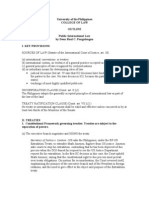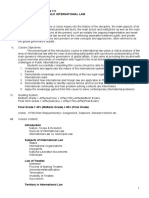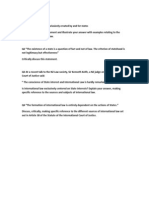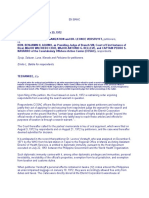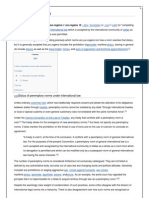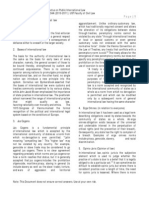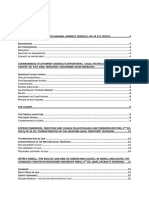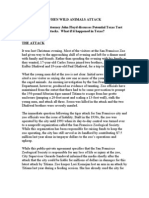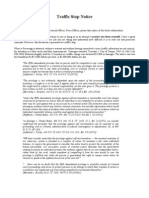Sources of International Law (Bernas)
Sources of International Law (Bernas)
Uploaded by
April GuiangCopyright:
Available Formats
Sources of International Law (Bernas)
Sources of International Law (Bernas)
Uploaded by
April GuiangOriginal Description:
Copyright
Available Formats
Share this document
Did you find this document useful?
Is this content inappropriate?
Copyright:
Available Formats
Sources of International Law (Bernas)
Sources of International Law (Bernas)
Uploaded by
April GuiangCopyright:
Available Formats
SOURCES OF INTERNATIONAL LAW
Formal sources refers to various processes by which rules come into existence, i.e. legislation, treaty making and
judicial decision making as well as the practice of states.
Material sources not concerned with how rules come into existence but rather with the substance and content of the
obligation. E.g. state practice, UN Resolutions, treaties, judicial decisions and the writings of jurists; referred to as
evidence of international law.
Article 38 of the Statute of the International Court of Justice is primarily a directive to the Court on how it should
resolve conflicts brought before it. Article 38 says:
1. The Court, whose function is to decide in accordance with international law such disputes as are submitted to it,
shall apply:
a. international conventions, whether general or particular, establishing rules expressly recognized by contesting
states;
b. international custom, as evidence of a general practice accepted as law;
c. the general principles of law recognized by civilized nations;
d. subject to the provisions of Article 59, judicial decisions and the teachings of the most highly qualified publicists of
the various nations, as subsidiary means for the determination of rules of law.
2. This provision shall not prejudice the power of the Court to decide ex aequo et bono, if the parties agree thereto.
Restatement (Third) of Foreign Relations Law of the United States, another source, says:
1. A rule of international law is one that has been accepted as such by the international community of states
a) in the form of customary law;
b) by international agreement; or
c) by derivation from general principles common to the major legal systems of the world.
2. Customary international law results from a general and consistent practice of states followed by them from a sense
of legal obligation.
- This statement contains the two basic elements of custom:
a. the material factor, that is, how states behave. Elements are duration, consistency, and generality of the practice of
states.
North Sea Continental Shelf Cases: . . Although the passage of only a short period of time is not necessarily, or of
itself, a bar to the formation of a new rule of customary international law on the basis of what was purely a
conventional rule, an indispensable requirement would be that within the period in question, short though it might be,
State practice, including that of states whose interests are specially affected, should have been both extensive and
virtually uniform in the sense of the provision invoked and should moreover have occurred in such a way as to
show a general recognition that a rule of law or legal obligation is involved.
Uniformity and generality of practice need not be complete, but it must be substantial. In Nicaragua v. United States
(ICJ Reports 1986), the Court said that the practice need not be in absolute conformity with the purported
customary rule. It said:
In order to deduce the existence of customary rules, the Court deems it sufficient that the conduct of states should, in
general, be consistent with such rules, and that instances of state conduct inconsistent with a given rule should
generally have been treated as breaches of that rule, not as indications of the recognition of a new rule.
b. and the psychological or subjective factor, that is, why they behave the way they do.
Do states behave the way they do because they consider it obligatory to behave thus or do they do it only as a matter
of courtesy? Opinio juris, or the belief that a certain form of behavior is obligatory, is what makes practice an
international rule. Without it, practice is not law. ... Even humanitarian consideration by itself does not constitute
opinio juris.
Nicaragua Case: Either the States taking such action or other States in a position to react to it, must have behaved so
that their conduct is evidence of a belief that this practice is rendered obligatory by the existence of a rule of law
requiring it.
The need for such a belief, i.e., the existence of a subjective element, is implicit in the very notion of the opinio juris
sive necessitatis.
3. International agreements create law for the states parties thereto and may lead to the creation of customary
international law which such agreements are intended for adherence by states generally and are in fact widely
accepted.
4. General principles common to the major legal systems, even if not incorporated or reflected in customary law or
international agreements, may be invoked as supplementary rules of international law where appropriate.
DISSENTING STATES; SUBSEQUENT CONTRARY PRACTICE
Dissenting states will be bound by custom unless they had consistently objected to it while the custom was merely in
the process of formation. Dissent, however, protects only the dissenter and does not apply to other states. Moreover,
a state joining the international law system for the first time after a practice has become law is bound by such
practice.
It is also possible that after a practice has been accepted as law, contrary practice might arise. Such contrary practice
can cast doubt on the alleged law. Over time, if the contrary practice should gain general acceptance, it might instead
become the law.
EVIDENCE OF STATE PRACTICE AND OPINIO JURIS
These can be treaties, diplomatic correspondence, statements of national leaders and political advisers, as well as
the conduct of states. By themselves, however, they do not constitute customary law unless characterized by opinio
juris. The existence of opinio juris is a matter of proof. The burden of proving its existence falls on the state claiming
it. Opinio juris may be deduced from the attitude of parties and states to a particular law. Consent to such resolutions
is one of the forms of expression of an opinio juris.
INSTANT CUSTOM
It comes about as a spontaneous activity of a great number of states supporting aspecific line of action.
You might also like
- International Law, Malcolm ShawDocument2 pagesInternational Law, Malcolm ShawDan Go100% (1)
- Common Law and Civil LawDocument2 pagesCommon Law and Civil LawRitch LibonNo ratings yet
- Bernas Public International LawDocument5 pagesBernas Public International LawJorg ィ ۦۦNo ratings yet
- The Trail Smelter ArbitrationDocument26 pagesThe Trail Smelter ArbitrationJulianNo ratings yet
- Hard Notes - 1F Complete ObliCon TranscriptDocument184 pagesHard Notes - 1F Complete ObliCon TranscriptApril GuiangNo ratings yet
- People V LalliDocument3 pagesPeople V LalliApril Guiang100% (1)
- Route Surveying PDFDocument21 pagesRoute Surveying PDFApril Guiang60% (5)
- People v. People of The Philippines V BenitoDocument2 pagesPeople v. People of The Philippines V BenitoJose Noel Hilario100% (2)
- Public International Law ConceptsDocument4 pagesPublic International Law ConceptsLoueljie AntiguaNo ratings yet
- State Responsibility in International LawDocument28 pagesState Responsibility in International LawRaju KD100% (2)
- 3-183 Trendex Trading V Bank of Nigeria 3-183 Trendex Trading V Bank of NigeriaDocument1 page3-183 Trendex Trading V Bank of Nigeria 3-183 Trendex Trading V Bank of NigeriaZhanika Marie CarbonellNo ratings yet
- PIL Exam NotesDocument16 pagesPIL Exam NotesDumakude GcabasheNo ratings yet
- 02 Congo V RwandaDocument2 pages02 Congo V RwandaMichael Parreño VillagraciaNo ratings yet
- Hard Law Soft LawDocument2 pagesHard Law Soft LawDianne Yco100% (1)
- PIL Reviewer Quiz 1 FinalsDocument3 pagesPIL Reviewer Quiz 1 Finalslou017No ratings yet
- NUCLEAR WEAPONS Advisory OpinionDocument10 pagesNUCLEAR WEAPONS Advisory OpinionAriel LunzagaNo ratings yet
- Asylum Case (Summary) - Public International LawDocument10 pagesAsylum Case (Summary) - Public International LawAnton Ric Delos ReyesNo ratings yet
- PIL Integrated Outline Part1Document12 pagesPIL Integrated Outline Part1Francis Paolo TiopiancoNo ratings yet
- Case Concerning Armed Activities On The Territory of The CongoDocument9 pagesCase Concerning Armed Activities On The Territory of The CongoSheryll Aleth BaccayNo ratings yet
- Underhill v. Hernandez, 168 U.S. 250 (1897)Document5 pagesUnderhill v. Hernandez, 168 U.S. 250 (1897)Jumen Gamaru TamayoNo ratings yet
- Dolly M. E. Filartiga and Joel Filartiga v. Americo Norberto Pena-Irala, 630 F.2d 876, 2d Cir. (1980)Document22 pagesDolly M. E. Filartiga and Joel Filartiga v. Americo Norberto Pena-Irala, 630 F.2d 876, 2d Cir. (1980)Scribd Government DocsNo ratings yet
- Velonta vs. Chief, Phil. ConstabularyDocument2 pagesVelonta vs. Chief, Phil. ConstabularyKarla ßallesterosNo ratings yet
- Course OutlineDocument2 pagesCourse Outlinegilberthufana446877No ratings yet
- Monism and Dualism in International LawDocument7 pagesMonism and Dualism in International LawTariq KhanNo ratings yet
- Villavicencio vs. Lukban., 39 Phil., 778, No. 14639 March 25, 1919Document8 pagesVillavicencio vs. Lukban., 39 Phil., 778, No. 14639 March 25, 1919Jin AghamNo ratings yet
- North Sea Continental Shelf CasesDocument18 pagesNorth Sea Continental Shelf CasesHenry LNo ratings yet
- Lecture 8 Notes - Immunity From JurisdictionDocument7 pagesLecture 8 Notes - Immunity From JurisdictionMichael John GabrielNo ratings yet
- Recognition PILDocument12 pagesRecognition PILuma mishra100% (1)
- Public Internaitonal Law Questionss and AnswersDocument18 pagesPublic Internaitonal Law Questionss and AnswersFaye Cience BoholNo ratings yet
- CYNDIA International Criminal Law Presentation 2Document26 pagesCYNDIA International Criminal Law Presentation 2ekaka100% (1)
- PIL Aequo Et BonoDocument1 pagePIL Aequo Et BonoHuehuehueNo ratings yet
- Criminal Law: Answers To Bar Examination Questions INDocument86 pagesCriminal Law: Answers To Bar Examination Questions INJof BotorNo ratings yet
- Bautista VS, CA July 6, 2001Document6 pagesBautista VS, CA July 6, 2001Erisa RoxasNo ratings yet
- Internation Law ReviewerDocument105 pagesInternation Law ReviewerJf LarongNo ratings yet
- Family Code: Atty. Gideon MortelDocument16 pagesFamily Code: Atty. Gideon MortelColleen BunyiNo ratings yet
- 2 Greece (Mavrommatis) Vs Great BritainDocument2 pages2 Greece (Mavrommatis) Vs Great BritainMINAMI IWAYAMANo ratings yet
- International Court of JusticeDocument1 pageInternational Court of JusticeCEMA2009100% (1)
- PrenuptialDocument5 pagesPrenuptialISLAMIC LIBRARY100% (1)
- S.S. LotusDocument3 pagesS.S. LotusRhev Xandra Acuña100% (1)
- Definitions. International LawDocument39 pagesDefinitions. International LawMohsin Azhar ShahNo ratings yet
- International Law Past Exam QuestionsDocument1 pageInternational Law Past Exam QuestionsMarilyn WooNo ratings yet
- AW OF Reaties: University of San Carlos School of LawDocument54 pagesAW OF Reaties: University of San Carlos School of LawFedencio Costuna100% (1)
- The Paquete Habana (The Paquete Habana and The Lola)Document25 pagesThe Paquete Habana (The Paquete Habana and The Lola)Ryla PasiolaNo ratings yet
- Mabuhay Holdings CopporationDocument3 pagesMabuhay Holdings CopporationDarius King Villarmea0% (1)
- People v. RamosDocument2 pagesPeople v. RamosAilyn AñanoNo ratings yet
- WRIGHT vs. CADocument2 pagesWRIGHT vs. CAMarella BeatrizNo ratings yet
- Nature, Definition and Scope of International Law (PIL Project)Document13 pagesNature, Definition and Scope of International Law (PIL Project)Crate MakerNo ratings yet
- 06 Columbia v. PeruDocument2 pages06 Columbia v. PeruRem SerranoNo ratings yet
- WHO vs. Aquino GR No. L-35131 Nov 29 1972Document6 pagesWHO vs. Aquino GR No. L-35131 Nov 29 1972Krystine GodalleNo ratings yet
- International Law-II Immunities From National JurisdictionDocument20 pagesInternational Law-II Immunities From National JurisdictionRefikaNo ratings yet
- Mijares V RanadaDocument30 pagesMijares V RanadaOlivia JaneNo ratings yet
- International Law, A True LawDocument2 pagesInternational Law, A True LawhbcgNo ratings yet
- Hard Law Soft LawDocument2 pagesHard Law Soft LawDianne YcoNo ratings yet
- Vienna Convention On The Law of Treaties 1966 CommentaryDocument89 pagesVienna Convention On The Law of Treaties 1966 CommentaryVíctor MirandaNo ratings yet
- ILC Draft Articles On Responsibility of States For Internationally Wrongful ActsDocument114 pagesILC Draft Articles On Responsibility of States For Internationally Wrongful ActsOlivia Js TaebenuNo ratings yet
- Peremptory Norm: Status of Peremptory Norms Under International LawDocument4 pagesPeremptory Norm: Status of Peremptory Norms Under International LawSeng SovantharathNo ratings yet
- Public International Law ConspectusDocument25 pagesPublic International Law Conspectusmaster386No ratings yet
- Case Digest - The North Sea Continental Shelf CasesDocument3 pagesCase Digest - The North Sea Continental Shelf Casesdarius100% (1)
- Public International Law (Prohibition Of) Use of ForceDocument8 pagesPublic International Law (Prohibition Of) Use of ForceTsz Ching EmilyNo ratings yet
- Overview KosovoDocument2 pagesOverview KosovoElie100% (1)
- South West Africa CasesDocument1 pageSouth West Africa Casesgem_mataNo ratings yet
- Ii. Sources of International Law: Restatement (Third) of Foreign Relations Law of The United StatesDocument5 pagesIi. Sources of International Law: Restatement (Third) of Foreign Relations Law of The United StatesMuji JaafarNo ratings yet
- Source of InternatiDocument3 pagesSource of InternatiHabtamu GabisaNo ratings yet
- PIL NotesDocument21 pagesPIL Notesananya ahujaNo ratings yet
- Joint Ventures Under The Philippine Competition ActDocument3 pagesJoint Ventures Under The Philippine Competition ActApril GuiangNo ratings yet
- ChuGui Finals Col Notes PDFDocument105 pagesChuGui Finals Col Notes PDFApril GuiangNo ratings yet
- Transpo Cases - Transportation of GoodsDocument40 pagesTranspo Cases - Transportation of GoodsApril GuiangNo ratings yet
- Ctober Etitioner Istilleria Ashinton NC or Ashinton Istillery NC Espondent Ourt of Ppeals A Ondeña Istillers NC Itug ActsDocument8 pagesCtober Etitioner Istilleria Ashinton NC or Ashinton Istillery NC Espondent Ourt of Ppeals A Ondeña Istillers NC Itug ActsApril GuiangNo ratings yet
- Clarence Tiu Supplement PDFDocument21 pagesClarence Tiu Supplement PDFApril GuiangNo ratings yet
- Distilleria Washington CaseDocument3 pagesDistilleria Washington CaseApril GuiangNo ratings yet
- Evidence Notes RianoDocument3 pagesEvidence Notes RianoApril GuiangNo ratings yet
- Positive and Negative EvidenceDocument1 pagePositive and Negative EvidenceApril GuiangNo ratings yet
- Guiang, April - Thesis OutlineDocument4 pagesGuiang, April - Thesis OutlineApril GuiangNo ratings yet
- Sample OutlineDocument11 pagesSample OutlineApril GuiangNo ratings yet
- Bank of America V CADocument1 pageBank of America V CAApril GuiangNo ratings yet
- People V CA and OlayonDocument1 pagePeople V CA and OlayonApril GuiangNo ratings yet
- Accession ChartsDocument5 pagesAccession ChartsApril GuiangNo ratings yet
- CEMONCDocument10 pagesCEMONCApril GuiangNo ratings yet
- Diabetes Mellitus Survey in The PhilippinesDocument2 pagesDiabetes Mellitus Survey in The PhilippinesApril GuiangNo ratings yet
- Declaration of State Policies: B. RightsDocument2 pagesDeclaration of State Policies: B. RightsCharm AgripaNo ratings yet
- CJSDocument18 pagesCJSMagr EscaNo ratings yet
- Memorial For Petitioner, CLSGIBS06 PDFDocument35 pagesMemorial For Petitioner, CLSGIBS06 PDFRakshit Taneja100% (1)
- Appellee Vs Vs Appellants: Second DivisionDocument11 pagesAppellee Vs Vs Appellants: Second DivisionAli NamlaNo ratings yet
- CASE OF VALLIANATOS AND OTHERS v. GREECE, 29381-09 PDFDocument50 pagesCASE OF VALLIANATOS AND OTHERS v. GREECE, 29381-09 PDFGeorge PayneNo ratings yet
- Concept of Domicile Under Private International LawDocument26 pagesConcept of Domicile Under Private International LawTasaduq100% (1)
- A.C. No. 7178 Gimena Vs Atty Sabio 08-23-2016Document9 pagesA.C. No. 7178 Gimena Vs Atty Sabio 08-23-2016MARIA KATHRINA BENITEZNo ratings yet
- Develpoment of Administrative LawDocument10 pagesDevelpoment of Administrative LawHeracles PegasusNo ratings yet
- Special Proceedings NotesDocument17 pagesSpecial Proceedings NotesJaster salleNo ratings yet
- Macfarlane Wrongful-Convictions PDFDocument90 pagesMacfarlane Wrongful-Convictions PDFJanie Duncan100% (1)
- LAWS1006 Case NotesDocument49 pagesLAWS1006 Case NotesSeanGongNo ratings yet
- Principles of Criminal LawsDocument2 pagesPrinciples of Criminal Lawssinaglaya hallNo ratings yet
- Evidence - 021922Document2 pagesEvidence - 021922DANICA FLORES67% (3)
- 01-08-08 WFP Tiger LiabilityDocument8 pages01-08-08 WFP Tiger LiabilityHouston Criminal Lawyer John T. FloydNo ratings yet
- Right To Constitutional RemediesDocument6 pagesRight To Constitutional RemediesSuraj SinghNo ratings yet
- PALE Quiz # 1Document3 pagesPALE Quiz # 1SJ LiminNo ratings yet
- Rhetorical Analysis Teresa NjorogeDocument2 pagesRhetorical Analysis Teresa Njorogeapi-490198692No ratings yet
- Conflict of Laws OutlineDocument54 pagesConflict of Laws OutlinesjanvieNo ratings yet
- Traffic Stop Notice 1Document4 pagesTraffic Stop Notice 1trthseekr7690% (10)
- Virtue EthicsDocument22 pagesVirtue EthicsNovelyn Calacala JacobNo ratings yet
- Social Legislation Questionnaire With AnswersDocument4 pagesSocial Legislation Questionnaire With AnswersBlessy Marie Patacsil AringoNo ratings yet
- 43 Canezo v. RojasDocument3 pages43 Canezo v. RojasAgus Diaz100% (2)
- H. 45 Lagman Vs MedialdeaDocument4 pagesH. 45 Lagman Vs MedialdeaPatricia BautistaNo ratings yet
- IPC PROJECT - Vijay Srinivas K. - 2018095 - CRITICAL ANALYSIS OF SECTION 84 OF INDIAN PENCAL CODE, 1860Document52 pagesIPC PROJECT - Vijay Srinivas K. - 2018095 - CRITICAL ANALYSIS OF SECTION 84 OF INDIAN PENCAL CODE, 1860Vijay Srinivas KukkalaNo ratings yet
- CPC and LimitationDocument185 pagesCPC and LimitationAishvarya PujarNo ratings yet
- Ethics and Professional Conduct Notes: Nicholas SaadyDocument12 pagesEthics and Professional Conduct Notes: Nicholas SaadyBrian Okuku OwinohNo ratings yet
- E-SCRA Begosa vs. ChairmanDocument12 pagesE-SCRA Begosa vs. Chairmanflordelei hocateNo ratings yet
- Từ Vựng Cực Chất Cho Chủ Đề Crime and PunishmentDocument4 pagesTừ Vựng Cực Chất Cho Chủ Đề Crime and PunishmentĐăng HưngNo ratings yet
- Cornejo Vs SandiganbayanDocument8 pagesCornejo Vs SandiganbayanElla PerezNo ratings yet

















